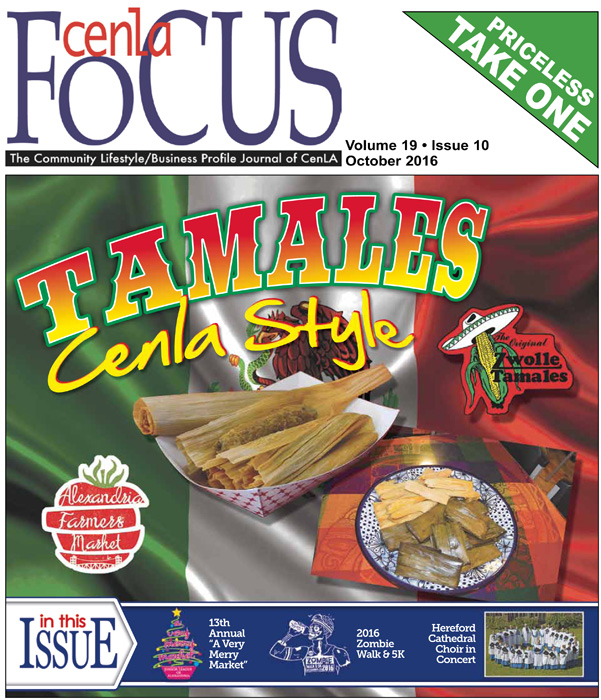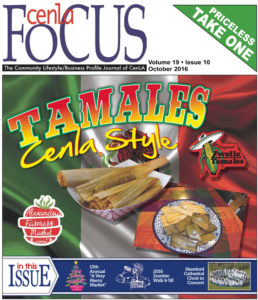
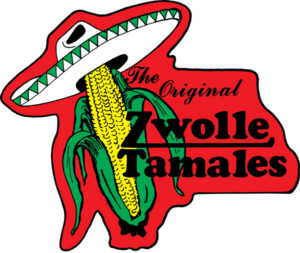

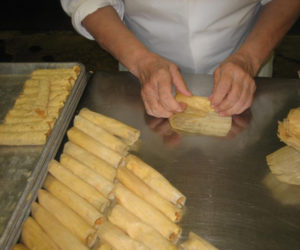
Their recipe is as close to her grandma’s recipe as can be, Ginger adds. “My grandma helped with the recipe. She ate tamales often. She was eating them right up till the time she passed away. She was 107,” Ginger adds.
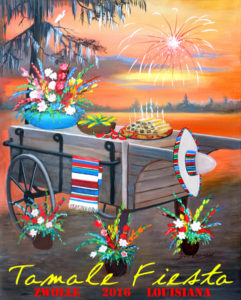
Pat Procell, a board member of the Zwolle Tamale Fiesta, agrees. “Families get together during the tamale fiesta. They may skip Christmas or Thanksgiving, but they get together for the Zwolle Tamale Fiesta. Our tamales are not like any other. They have a unique flavor from a family recipe that has been passed down,” Procell says.
In addition to the popular eating contests and tamale making demonstrations, the 2016 Zwolle Tamale Fiesta will feature a petting zoo, a carnival midway, arts and craft vendors, storytelling and 10 bands playing live music. The festival begins Thursday, October 6th, with “Senior Citizens Day” from 10:00am to 1:00pm. A lunch will be provided, with live bingo games. Kick-off ceremonies will begin at 6:00pm with the presentation of the Fiesta Royalty. Friday’s festivities include the Third Grade Educational Day and a street dance with live music that evening. At 10:00am, Saturday, October 8th, the Tamale Fiesta parade will roll. The Toledo Cruisers Club Car Show will begin at 11:30am, with an arm wrestling contest at 12:30pm and live music all afternoon into the night. “There’s something for everyone at the Fiesta from watching young kids in a tamale-eating contest to just sitting and listening to the music. We try to add something new each year,” Procell says. This year, the limited edition 2016 Zwolle Tamale Fiesta poster features original artwork by artist Don Edwards. For more information about the Zwolle Tamale Fiesta, visit www.zwolletamalefiesta.com.
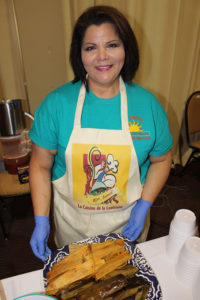
After living in the Rio Grande Valley in Texas for three years, she and her husband moved to Ferriday. Rodriguez started making homemade tamales and selling them to friends for $3.00 a dozen. Word spread about her tamales, and soon she was making dozens of tamale batches weekly. At that time, Rodriguez was working in a grocery store bakery, and making her tamales on the side. Later, she moved with her three children to Natchitoches, where she continued working as a grocery baker.
Soon after the move, Rodriguez’s tamale clientele grew to the extent that she was able to leave her day job to focus on making tamales full-time. She hand made between 300 to 500 dozen tamales every week. Her reputation as a tamale expert grew. In 1997, Rodriguez was asked to represent the Mississippi Delta region in the 31st Annual Festival of American Folklife in Washington, D.C. Her signature recipe of a pork tamale became part of the archives at the Smithsonian. Congressmen and senators wrote letters to Rodriguez thanking her for her participation. Later, she was invited to be a guest on the Ethma Odum TV show. “My tamales got famous,” Rodriguez, sitting at her restaurant, says with a grin.
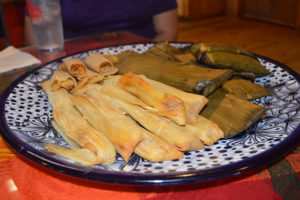
Irma has several trophies displayed in Mi Terra’s from various tamale competitions she has won over the years by creating crawfish tamales, spinach and black bean tamales, chicken tamales and sweet potato tamales. On October 15th, Rodriguez plans to compete in the commercial tamale contest at the Delta Hot Tamale Festival in Greenville, Mississippi. “Making tamales with my family is a labor of love, and I get emotional thinking of family gathering together to make the tamales,” Rodriguez says, adding that all her hard work in making the tamales and building up the restaurant business has been worth it. “All my sacrifice has had its rewards. I want it to be a legacy that I will one day pass on to my children and grandchildren. I’ve poured the cement and built the home, it will be up to them to do the maintenance and repairs,” she notes.
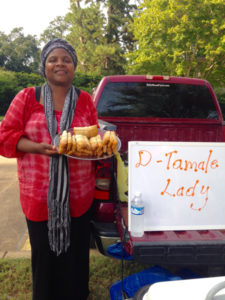
Murphy, who hails from Tensas parish, said she learned about bulgar wheat during a health seminar, and discovered it provided a “meaty” texture to the homemade tamales. “I’ve been selling the vegan hot tamales at the farmers market for the last two years, and they’ve been a big hit. People love the texture and say they taste great,” Murphy says while arranging her tamales on the table at her booth.
She incorporates the bulgar wheat as the plant-based filling for her tamales, and adds chopped vegetables, including kale and collard greens, with the seasonings. It can take up to two hours just to steam the tamales, and Murphy hand makes about 30 dozen each week to sell at the market. “I enjoy making the tamales. To me, it’s like therapy. I can relax and think things through,” she says of her tamale making. It has been time well spent, as Murphy was able to pay her children’s college education through her tamale sales.
Delores did not grow up learning how to make tamales. Instead, she learned how to make them from an elderly woman in her neighborhood who sold tamales of her own. “I was transitioning into a vegetarian, and was modifying recipes. She shared her knowledge as we sat and rolled her tamales,” Murphy notes. Besides vegan hot tamales, Murphy does make spicy and mild beef hot tamales, along with vegan chili. At her booth, she sells homemade tea cakes, along with cards reproduced from her art work.
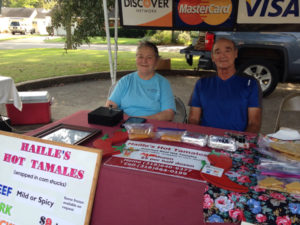
For years, his family would get together and make tamales, and then they started selling the tamales to give Haille a little extra spending money, Randel notes. “Ours is more of a Mexican-style tamale. We use as good of a cut of meat as we can get,” Randel says, adding they usually cook a pork loin and grind it for the tamales. “We are very cautious to use good materials. We buy our shucks out of San Antonio because they have a higher quality of corn shucks,” he says, adding they use two types of mesa in their tamales.
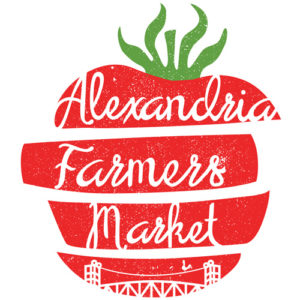
He prepares between 30 to 40 dozen tamales each week for the markets. In addition to the pork variety, Randel and Linda also offer beef and all-white meat chicken tamales. On occasion, they will make a two-bean and four-cheese tamale. All their tamales are steamed, not boiled. The two like to hear feedback from patrons, and they like to swap stories about the traditions of families cooking together. “We don’t cook our tamales in a sauce. I try to make a tamale that you don’t need anything with,” Randel explains.
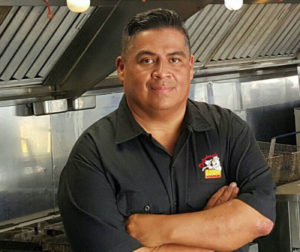
They import Spanish paprika from Spain and chile de a’rbol peppers and gualo chilies from Mexico for the tamales served at his restaurant. He also buys the corn shucks for his tamales from Mexico. Valenzuela, who was raised in Lafayette and was trained to cook by the late Paul Prudhomme, formerly owned the Little Caesars Pizza locations in the state. After selling the pizza businesses, he decided to open the Cajun restaurant. While Cajun may be the theme, he knew that he wanted to include tamales on his new restaurant’s menu. “I believe I have the only restaurant in the state that serves boudin and tamales together,” Valenzuela chuckles.
When he first attempted to recreate his great-grandmother’s tamales, he knew something was missing. So, he went as close to the source as he could, visiting his hometown to talk it over with relatives. “We nailed it. It was the chili pequin—a small, very hot chili. We have it ground. I make an authentic real Indian Hispanic flavor tamale,” adds Valenzuela.
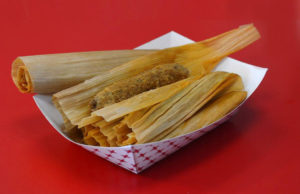
Whether enjoying tamales at a Cenla restaurant, market or festival, or gathering with family and friends to make them at home, tamales are a food that brings people together. The tradition of making tamales is passed from generation to generation, creating lasting memories through time spent in a labor of love.

